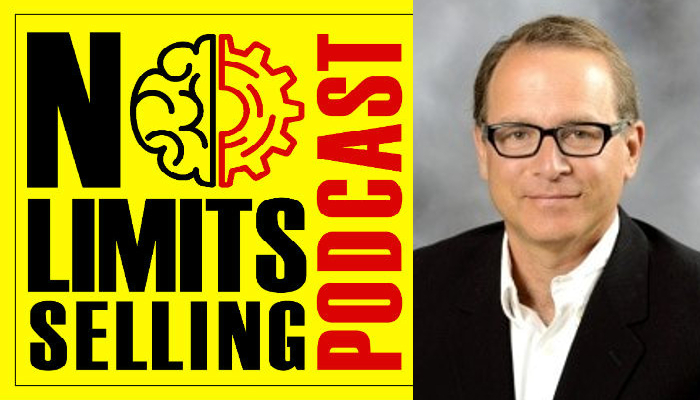How to Build Trust with Your Clients in 4 Steps
On Episode 236 of The No Limits Selling Podcast, we have Michael Permack, Co-Founder and Managing Partner at Spire Group Inc. Michael is an expert in the healthcare sector. He provides advice to healthcare professionals and has developed, leased, bought, and sold properties in this sector.
His company has saved healthcare professionals $525 million over his career. Recently, he launched the healthcare investment network to create win-win, no-conflict investment opportunities following investment strategies from industry experts to benefit healthcare professionals. Michael is an Ivey MBA graduate and has been an entrepreneur for most of his career. A Governor General Award was awarded to Michael for the volunteer work performed with the Canadian Cancer Society. He has also been recognized with the Medal of Courage from the Canadian Cancer Society.
In this episode, Michael shares with us ways to help build trust with your clients.

Contact Michael:
[EDITOR’S NOTE: This podcast is sponsored by No Limits Selling. It is a fun, fast-paced podcast that delivers hard-fought business advice that you can implement today to improve your sales and performance]
Interested In Our Real Estate Coaching Services? Explore Our Website: Link
Feeling Not Well Today? You Can Use Our Mindset Boosters App To amp Up Your Mood: Link
Find us on Social Media:
LinkedIn | Facebook community | Instagram
Like what do you listen to? Subscribe to our podcast!
Ready to become fearless? We can help you become fearless in 60 days so you accomplish more in your career Schedule A 15 min Call with Umar
Summary
Introduction and Background
The podcast begins with an introduction to Michael Permack, the Co-Founder and Managing Partner at Spire Group Inc. Permack shares his background in the financial industry, detailing his journey from starting as a financial advisor to co-founding Spire Group Inc. He discusses the challenges and rewards of his career path, emphasizing the importance of perseverance and adaptability, and how virtues such as these help build trust with your clients.
Spire Group Inc. and Its Mission
Permack then delves into the mission and operations of Spire Group Inc. The company aims to provide comprehensive financial services to its clients, focusing on wealth management, estate planning, and retirement planning. Permack explains how Spire Group Inc. differentiates itself from other financial firms through its personalized approach to financial planning and its commitment to maintaining long-term client relationships that help build trust.
Approach to Wealth Management
The podcast continues with Permack discussing his approach to wealth management. He emphasizes that it's important to understand each client's unique financial situation and goals and build trust with them. He also highlights the need for ongoing communication and education to ensure clients are informed and comfortable with their financial plans.
Challenges in the Financial Industry
Permack shares some of the challenges he has faced in the financial industry. These include navigating the complexities of financial regulations, staying updated with the latest financial trends and technologies, and managing client expectations. Despite these challenges, Permack expresses his passion for his work and his commitment to providing the best service to his clients.
Advice for Aspiring Financial Advisors
Towards the end of the podcast, Permack offers advice for individuals aspiring to become financial advisors. He encourages them to continuously learn and adapt, to build trust and strong relationships with clients, and to always act with integrity and professionalism.
Conclusion
In this podcast, Michael Permack, Co-Founder and Managing Partner at Spire Group Inc. shares his journey from being a financial advisor to co-founding his firm. He discusses the mission of Spire Group Inc., which is to provide comprehensive financial services with a personalized approach, focusing on wealth management, estate planning, and retirement planning. Permack emphasizes the importance of understanding each client's unique financial situation and maintaining open communication.
Despite the challenges in the financial industry, such as complex regulations and rapidly changing trends, Permack remains passionate about his work and committed to his clients. He offers advice to aspiring financial advisors, encouraging continuous learning, relationship building, and professional integrity. The podcast concludes with Permack's optimistic outlook for the future of Spire Group Inc. and its continued dedication to its mission and clients.
Faq
Who is Michael Permack?
What is Spire Group Inc.?
What is Michael Permack's approach to wealth management?
What challenges has Michael Permack faced in the financial industry?
What advice does Michael Permack have for aspiring financial advisors?
What is the future of Spire Group Inc.?
Don’t miss this opportunity to transform your real estate career with one-on-one coaching. As an experienced real estate coach, I, Umar Hameed, am dedicated to helping you unlock your full potential and achieve your real estate goals. To learn more about who am I and my clients ↓
If you’re ready to take the next step, book an appointment with me today and begin your journey toward success in the real estate industry.
